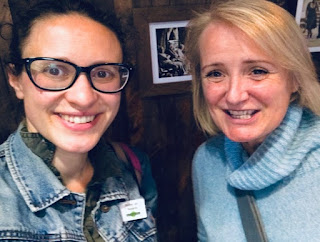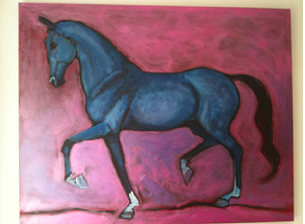ABOUT THE AUTHOR
Lucy van Smit is an award-winning author and an artist who regrets selling off most of her paintings to pay the rent (Jeremy Clarkson owns two).
After boy trouble, Lucy dropped out of Art School for a year, ran away to New York and dared herself to sell encyclopedias door-to-door in America. She got her BA Hons in Fine Art, landed a job in TV, travelled worldwide for NBC News, flew on Air Force One with President Reagan, got surrounded by tanks at Manila airport during a coup, before she chilled and made documentaries for Canadian TV on writers like John Le Carre and Ian McEwan. Lucy is dyslexic with a Distinction in MA Creative Writing. The Hurting won the inaugural Bath Children’s Novel Award. One of six siblings, Lucy lives in London with her hubby, teenage son and their mad cat, known locally as Sid Vicious.
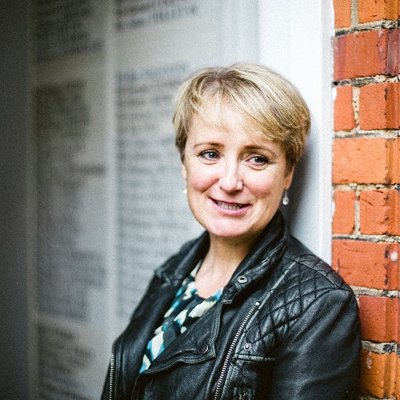
PRESS AND INTERVIEWS
Earlier this week, Barry Cunningham of Chicken House books announced the acquisition of Van Smit’s 2015 Bath-winning YA thriller THE HURTING from for publication in 2018. On the eve of the announcement of the winner of our second Children’s Novel Award, inaugural winner Lucy Van Smit tells us about her book deal joy.
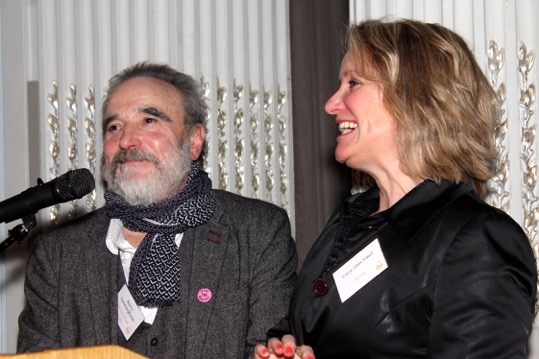
Congratulations again, Lucy, on your brilliant book deal news…
Thank you! I’m in a daze after Barry Cunningham’s announcement on Friday at the swanky London Savile Club. It was quite a moment. Full of the lovely Golden Egg Academy folk, great writers, and lots of fizz. Chicken House novelist James Nicol immediately welcomed me into the coop. I couldn’t believe my luck, I never expected Chicken House to love my book. I can’t wait to work with them.
You already know how much and why we loved THE HURTING, but what did Chicken House say were the reasons they were so determined to acquire your manuscript?
My ears are still blushing. They kept saying THE HURTING was extraordinary. And how much they loved the voice, my writing, and the layering to the book. Barry commented on the humour. I was stunned. I think editor Rachel Leyshon could hear my disbelief and gently assured me I was a hugely talented writer. It was heady stuff.
It’s been a year since you accepted representation with Sallyanne Sweeney [literary agent and Bath Children’s Novel Award 2015 judge]. How much editing did you do before going out on submission?
The first round of edits was done by February 2016. Then Sallyanne came back about six weeks later, and I think we had our first face-to-face editorial meeting in early May. That was for a major structure edit, and I worked on the final changes until mid July.
Were any of the editorial changes tough to make?
Yes, some. But publication is a collaboration, so I listened. Mostly! Then just before it was sent out, Sallyanne thought we didn’t need the opening chapter, as the voice was strong enough. I experimented, and could see how it could work, but it felt like going to a party with no make up. And no clothes. Very scary.
The reports from the Bath judges was really useful too. I could see common threads, and took out one plot twist, which Sallyanne thought was overcomplicated.
It’s been brilliant, and tough. Writing is one thing; the road to publication is more complex. Painful. Confusing. So much is out of your control. I found I started to worry about getting published, which I hadn’t before. It sounds mad, but I always felt confident that would happen, and my job was to be a good enough writer when it did. I’ve learned to trust my judgment, and not seek approval. In between edits, I researched another book, learned how to write a film script.

When did THE HURTING go out on submission?
Sallyanne sent it out to a select group of editors, shortly after the Frankfurt Book Festival. A few publishers expressed strong interest, but I knew as soon as we spoke to Chicken House it was a fit, spookily like love at first sight!!
Can you share the pitch Sallyanne used for your book?
Yes. … “A contemporary Wuthering Heights, THE HURTING is a young adult psychological thriller about twisted love, obsession and sacrifice, set against the stunning backdrop of remote Norwegian fjords and an abandoned wolf reservation.”
Chicken House obviously have a great name in the industry, but what made you sure they were the right publishers for you?
No one can sell a book like the legendary Barry Cunningham. Just ask JK Rowling. To have not one, but two editors, the calibre of Barry and Rachel Leyshon to work on my book? I’ll learn tons from them. And I love their warmth.
On a sales note, Scholastic USA owns CH, and accesses the largest English speaking markets, yet CH retains complete editorial control. Chicken House won three Waterstones Books of the month with their 2016 debuts. Did I mention their blockbusters, like James Dashner’s Maze Runner? And Cathryn Constable’s Wolf Princess sold over a 100,000 copies worldwide. That is fantastic, by any standard. Sallyanne says other houses look to Chicken House to see what they are buying as they have great judgement.
You mentioned the Golden Egg Academy, how did they help you?
Mentoring. After my MA anthology launch, twelve agents came after my unfinished manuscript, I sent it out to a few, and got feedback that they didn’t like the bad boy, Lukas. I rewrote, and made Lukas and Ellie’s character more compelling, but not nicer. And I wanted to run my manuscript past an editor before sending it out to the remaining agents. I rang Imogen at Golden Egg and she calmed me down and gave me a mentor. Maurice Lyon then read THE HURTING and said it was in the vein of a Girl On A Train/Gone Girl noir thriller. Then I sent it into the Bath Children’s Novel Award to test it out.
Barry Cunningham of Chicken House with Imogen Cooper of the Golden Egg Academy
What’s next? Have you started on edits with Chicken House?
They asked to see the edited out scenes, and asked me NOT to rewrite anything until we spoke in person. Barry said THE HURTING needs a delicate, precise edit, and doesn’t want to lose any of the brilliant bonkers bits!
Have you started on your next book?
One story that came out of my research on Norway might not be suitable for YA, but it keeps circling in my head. I told Andrew Wille, a former Little Brown editor, and he said to me if I didn’t write it, he would. Then I was at the London Screenwriter’s festival, and chatted to the actor Assad Raja, who was cast as a terrorist in Homeland 5, and how frustrated he feels always portrayed as the bad guy. We talked about my first book, Invisible by Day, which inverts the tendency to cast Muslims as terrorists. It’s more of a fast-paced teen thriller, so might not be a natural follow on to a YA Noir romance, but we’ve not discussed book two yet with Chicken House.
We’re about to announce this year’s winner of the Children’s Novel Award. How does it feel to know another writer is about to take your ‘crown’?
It feels wonderful. Timely. I’ll be rooting for whomever Julia Churchill picks, and hope they get as lucky as me. I can’t thank you and the judges enough. And anyway, I’ll always be the Bath Children’s Novel Award inaugural winner!
Interview by Caroline Ambrose
Interview with LUCY VAN SMIT, Bath Children’s Novel Award 2015 Winner
LUCY VAN SMIT ON WINNING THE BATH CHILDREN’S NOVEL AWARD 2015 WITH HER NORDIC YA THRILLER, THE HURTING:
Congratulations on winning The Bath Children’s Novel Award and signing with judge Sallyanne Sweeney…
Thanks, it feels ridiculously wonderful, I’m still fizzling with a childlike delight, I didn’t expect it to be so exciting.
How was it, waiting to see how your novel progressed?
A little nerve wracking, I danced around my bedroom when I made the shortlist, but I never, ever expected to win. I was on longlists for the Mslexia Novel and The Caledonia Novel Award, and assumed THE HURTING was too YA to progress any further. To win The Bath Children’s Novel Award, and get my agent, Sallyanne Sweeney, in time for Christmas was brilliant. I was so flabbergasted, my 14-year-old son Archie had to read the announcement for me to confirm I’d won.
What reactions have you had from friends, family, writing colleagues?
Respect! Love it. The best reaction was from my husband, Nick. It’s a long game, writing, it takes years to learn the craft, and no one in your family knows if you’re any good. Nick’s always been supportive, and he was so proud of me, kept smiling to himself at work, and emailed all our friends. When Sallyanne Sweeney offered to represent me, I was touched how happy it made my ninety-year-old mum. Even my nephew gave me a bottle of champagne to say well done. My MA mates were thrilled. It was quite humbling. Archie kept giving me advice how to negotiate Hollywood deals!
What can you tell us about Sallyanne’s direction, vision and timescales for preparing THE HURTING for sending out to publishers?
Sallyanne likes the emotional abuse aspect to THE HURTING. We’re working on the structural edit, to simplify the major reveal, and include more on the Catholic family at the end. She’s sounded out a few publishers, and someone I know at a major publishing house is keen to see it, but Sallyanne says to wait until I’ve done the edits. I hope it’s ready in time for the Bologna Children’s Book Fair.
We were thrilled to discover your connection with Bath. [Van Smit lives in London, but studied Creative Writing for Young People at Bath Spa University, graduating with Distinction in 2015.] What were the most valuable things you learned during your MA?
I think I learned the importance of being gentle with my writing, and myself. Julia Green, the MA Director, always says you can only know something when you are ready to learn it. Ironically, the Publishing Module helped me the most, and I really didn’t want to do it. I wanted to concentrate on writing, and not worry about getting published, but Janine Amos helped me to up my game, understand where HSG might fit in the market, and how good something has to be to stand out. John Mclay, the international scout, teaches on the course too, and I ran the idea of Norway past him, and asked if I should change THE HURTING to something more thrillerish, like Dead Girl Talking, but John liked the original title. We are very spoilt on the MA for contacts and advice; every tutor is a published author. I’ll never forget the privilege of having a one-to-one with
David Almond. He’d inspired me to draw on my Catholic background, and I was thinking, Oh My God, Oh My God, it’s David Almond, while he critiqued my scene saying lovely things about the imagery. He and Julia taught me to think about rhythm in writing. And I found my tribe, my writing buddies, Chris Vick, Eden Endfield, Sarah Henderson, Jak Harrison, Rowena House, and Philippa Forester. They are super talented.
Tell us about THE HURTING…
Originally, I started with the baby’s abduction scene, which came from an exercise on the Bath Spa MA, to show character through action and dialogue. I thought about the worst thing my protagonist could do, and to steal someone’s baby is right up there for me. We’ve lost years in the IVF wilderness trying to have children, had multiple miscarriages and lost one son in stillbirth. But as my story evolved, I realised I wanted to write about a love that could never be, not an unrequited love, but a great love, with a dilemma. What if this love meant you couldn’t live with yourself?
Why Norway and why wolves?
I love Nordic Noir, and thought the fjords would be a perfect setting for YA. I didn’t want snow, and tonally the setting is like a Vlaminck painting, wild vibrant colours, bold lines, and dark shadows. A Fauve Norway that looks too bright, and has deadly undertones. As for wolves, Ellie is scared of dogs, and has to overcome her fears to save the baby from a wolf. I was interested in myths of feral children and needed to find a way to make it more plausible, hence the abandoned wolf reservation. Norwegians hunted wolves almost to extinction, and the recent reintroduction of wolves, near the Swedish border, is hotly debated, the farmers hate them. My antagonist is their champion in the book, who believes the predator, at the top of the food chain, saves his world by killing prey. It’s a twist on Cascade Theory in ecology.
Why do you think your novel won?
I think THE HURTING was very lucky to have champions amongst the teenage and adult judges in the earlier rounds, but ultimately it won because competition judge Sallyanne Sweeney and The Bath Children’s Novel Award team were brave enough to run with a YA novel that was a bit controversial.
At the extract reading stage, our panel each have a golden pass to give to one manuscript they absolutely love and want to see on the longlist. THE HURTING is the first book to win two golden passes, and also sparked some of the liveliest plot debates we’ve ever known. Have you had similar strong reactions from other readers, either during your MA or whilst out on submission to agents?
Yes, I was told this story of a boy manipulating a girl to steal a baby couldn’t work for children. But my tutors, Steve Voake, Julia Green, and Lucy Christopher, my second marker, were very encouraging, although Julia did say my story kept her awake at night thinking about the baby on the mountain. When the opening chapter was published in our MA Anthology, twelve agents contacted me, requesting the full manuscript, but I’d just ripped it apart to turn a granny into a dying sister. At the Foyle’s launch, several agents came up to me to asking to see it, and a couple who’d read it said how much they admired it, and thought it was a daring story, but not for their list. One agent told me outright that my antagonist was too horrible. So after three rejections, from agents who’d been super keen, I knew I had a problem, and realised if you change one character it changes everything, and Ellie now seemed selfish to want to be a songwriter when her sister was dying, so I sat down and rewrote it, made Ellie more empathetic, and the antagonist more dangerous.
Despite our judges all reading ‘blind’, you told us you were convinced you wouldn’t win, because you’d submitted to Sallyanne in the past…
I was completely convinced I wouldn’t win, and thought Sallyanne Sweeney would go for a Middle Grade funny novel. Also, two of the books on the shortlist had been independently published, and one long-listed for the Carnegie Prize, so I thought they’d be more polished, and at best I’d be the runner up. I’d won a SCWBI one-to-one with Sallyanne, and she’d given me feedback on my short story about a girl desperate to fight alongside her brother in WWI, written in second person through letters. Sallyanne liked it, but short stories were tough to sell, she gave me her card to keep in touch.
You’ve previously worked as a TV producer, making documentaries about writers. How did that come about?
That was a dream job after Art School; I worked for Canadian Broadcasting and pitched my first art documentary on John Le Carré. My boss said if I get him, I could produce it, expecting Le Carré to say no as usual. He’d not given an interview for ten years, ever since Melvin Bragg’s The South Bank Show. I worked out why, wrote to him, and told him what I wanted to do. When Le Carré rang to say yes, I fell off my chair in the Journal office. I’ve produced/directed docs on writers like Ian McEwan, Martin Amis, P.D. James, Kingsley Amis, Nadine Gordimer, and even Jeffrey Archer. I always wanted to film them in such a way the audience could get a real feel of the authors and their books. I hadn’t studied literature, I’m dyslexic, but I always thought I was a writer. It took years to admit to anyone that’s what I was doing, my non-writing friends and family still think of me as a painter.
As a SCWBI member, what would you say are the main benefits for aspiring children’s writers?
SCWBI is tremendously supportive of children’s writers and it’s well worth being a member. They run workshops, conferences, master classes and agent parties, and socials.
You applied for your MA after winning a SCWBI Slushpile Contest with an MG book. Would you say winning that first contest validated your application to the Bath MA course?
It definitely helped give me confidence. I came up to see the Bath Children’s Festival, and Julia Green was hosting a panel of the latest crop of published MA writers, and I was struck by how Julia beamed at Gill Lewis like a proud mother hen. And I remember thinking I want to be part of that tribe, and made a very last minute application to get on the course. Now it’s our turn to get published, and my mate Chris Vick is the first to go, publishing his beautiful story about a rookie surfer, KOOK, with Harper Collins in March.
Did you write THE HURTING from scratch during your MA?
Yes. It came out of Steve Voake’s excellent tutorial on showing a character though their actions.
Did you have set word count targets by the term?
Not really, but the course is structured to keep you writing. Every other week you workshop 1,500 words, and each term you get marked on 5,000 words, and a reflective commentary, which makes you think about what you are writing, and why. To keep you on track there a 10,000 word milestone, and the manuscript module is 40,000 words.
How long in total did it take to write the winning draft?
I wrote the ending almost immediately, as it mirrors the opening, so the whole story is told through dramatic irony, it builds dread and compassion for Ellie and the baby. Then my little brother died, very suddenly, and I was in a daze and couldn’t concentrate for months. I had a first draft, but not in the shape I wanted, but I submitted the first 40,000 words, and luckily still got a Distinction.
What’s your post-MA writing routine?
I lie in bed figuring out how the one major change, that Sallyanne suggested, has consequences for my character and the book, then I make coffee and turn the WiFi off. Ideally I climb back into bed, or go to a café, and do the edits. I can write on buses, on the floor, anywhere, and I read every day.
What are you writing now and any plans for the book you wrote before THE HURTING?
I’m editing this book, and I dug out INVISIBLE BY DAY, a 10+ thriller about a 14-year-old boy, Dan, who believes in honour, but his father is arrested for fraud, and Dan wants to prove his innocence. His sidekicks are Fingers a Goth girl thief, and Imran a debonair, disabled hacker, and the antagonist mirrors Satan from Paradise Lost, wanting revenge on mankind, and not caring if it backfires. The opening won a SCWBI competition, but I never sent it out, and started something new for the MA.
Which writers inspire you?
My first tutor, Sophie McKenzie, inspired me to believe I could write, she sat on her desk on the first day of a City Lit class, and said she was living proof that writing courses work. I started INVISIBLE BY DAY in her workshops. I’ve always been a bookworm, and have eclectic tastes from Siobhan Dowd to Kevin Brooks, Meg Rosoff to John Green, and I love the raft of newer writers, like Clare Furness, Francis Hardinge, and Chris Vick.
Favourite books?
This year it’s WOLF WINTER by Swedish writer, Cecelia Ekbäck. Last year I loved THE EARTH HUMS TO B FLAT by Mari Strachan. Archie’s and my all-time favourite book is WOLF BROTHER by Michelle Paver, and WHERE THE WILD THINGS ARE by Maurice Sendak. I’m into wolf books at the moment, like WOLF WILDER by Katherine Rendell. As a child I was addicted to Mary Renault and Enid Blyton. I read WUTHERING HEIGHTS at Christmas, as someone said my antagonist was like Heathcliff, and I was staggered how vengeful Heathcliff is as a character, yet is still beloved by us, as readers.
Favourite ‘how to’ write books?
A WRITER’S TALE by Russell T. Davies and Benjamin Cook; and STORY by Robert McKee.
What prompted you to enter The Bath Children’s Novel Award?
I entered the competition to test whether I’d got the story right; I knew it would help my pitch letter to stand out, if I got shortlisted. Bath is a hotbed for children’s books, with the Writing For Young People MA, Bath’s Children’s Literature Festival, and now it has the Bath Children’s Novel Award, as well as the Bath Novel Award.
Splashing or saving the prize money?
I brought Christmas presents, a cashmere bobble hat, and saved the rest for a writing retreat.
Lastly, any advice for anyone thinking of entering our next award?
Yes. Go for it. Winning is great, but the competition gave me a much-needed deadline to finish the manuscript, everything after that was a bonus.
Interview by Caroline Ambrose, 13 January 2016
2015 Winner:
LUCY VAN SMIT for THE HURTING (YA Psychological Thriller)
“With an incredibly strong voice and sustained suspense, THE HURTING is a YA thriller that had me at the edge of my seat from its arresting opening to the epic finale. Norwegian fjords, an abandoned wolf reservation, and dealing sensitively and powerfully with the darker side to religion and relationships – what’s not to love?” – 2015 Judge, Sallyanne Sweeney.
Lucy Van Smit: “I’ve always loved thrillers and wanted to write about a girl who must choose between the love of her life, and being able to live with herself. Entering the Bath Children’s Novel Award fired me up to finish my manuscript. I was in Kilarney, on the Robert McKee’s Story seminar, when I got long-listed, and had a week to send in the full manuscript. Each day, I studied ten hours with McKee, and edited through the night, finishing at 05.30 on the final Sunday, only to find the WiFi wouldn’t send the file! The shortlist knocked me out, especially as young, and adult, judges read your work. They characterised my story as ‘a daring, wolfish Nordic Noir.”
Lucy lives in London with her husband and teenage son. As a TV producer, she has made documentaries about writers including Ian McEwan and Martin Amis, but always had the feeling she was a writer too. After her 10+ novel, INVISIBLE BY DAY, won the first SCWBI Slushpile Competition, Lucy took an MA in Creative Writing at Bath Spa University, where she began writing THE HURTING. Lucy is now represented by 2015 judge, literary agent Sallyanne Sweeney and THE HURTING has been acquired by Barry Cunningham at Chicken House books for publication in 2018
Three months ago, Charlotte Eyre reported on a massive slump in YA sales. The social media furore and grievances derailed her question to editors and librarians on what caused it. Now adult fiction paperback sales have dropped 8.8% - and by way of explanation a young gleeful Times journalist claimed Netflix gobbled up her leisure time and was better value than a Waterstones paperback. So, is YA the canary in a dying publishing industry? And if so, why and how should we reverse the trend?
After a recent howler in the Guardian claiming that YA is a teenager that began with Harry Potter, The Bookseller Children’s Editor, Charlotte Eyre cites YA as upper teen, from age 14 to early twenties. She says “when a YA book gets it right, and hits the right audience, and covers the right subject, it can hit people at time when they really need it. Adolescence is kind of early adulthood. It's a time when your personality is in flux, often you're very confused, you don't know what you want, you don’t know what to think. You don't necessarily have the confidence to be yourself or do what exactly you want to do.”
21-year-old Junk by Melvin Burgess was Eyre’s favourite YA book as a teenager and she read about “heroin addiction and prostitution and kids who run away from home from my cosy middle-class life in Shropshire and it was just eye-opening. Malorie Blackman talks about YA as a safe way to explore those areas because with a book you can put it down whereas on screen you're bombarded with images.’
In Thrive, Arianna Huffington talks about “continuous distraction” and its detrimental effect on our mental health, reason enough to encourage young people off their screens and factor time in an overly prescriptive school day for them to read quietly, like we did in primary school.
As a former TV producer and debut YA author with ten years’ experience in children’s writing, I was pretty hacked off by the YA doom and dug into the Nielsen figures to see if the previous growth was an anomaly and if the core YA market had really changed that much.
Eyre says YA has always been a small but significant market. Nielsen told me it’s bigger than Adult Sci-Fi and fantasy. Have we under-calculated the cost of the ending of screen tie-ins like The Hunger Games, Divergent, Maze Runner etc? After all, even Mortal Engines which lost £300 million at the box office got a hike in book sales from £100,000 to £500,000.
But what constitutes a YA best-seller has shrunk alarmingly. My favourite book, The Poet X by Elizabeth Acevedo, just won the Carnegie. Today, Nielsen told me, “Poet X has reached about 4.4k copies and £30k for lifetime sales since the 2018 pub date. Weekly sales did go up after the win by about 200 copies.”
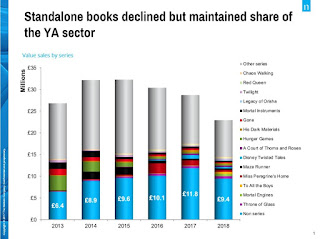 |
| Shows the leading 15 series in YA Fiction, and then grey is other series. Non-series was 33% in 2016, 41% in 2017 and 41% in 2018 |
Charlotte Eyre would like to see retailers stop treating YA as children's books, as it makes no sense for a 15-year-old to go to a section with picture books or to put YA into a silo, as teenagers don’t read like that, one minute they’re reading a Graphic Book, the next, The Day of the Triffids.
Further down the system, prior to publication, Eyre would like to see changes in publishing and marketing budgets put behind books, and if that means publishers publish less YA then Eyre thinks that's probably a good thing. And for the industry to support a broader UK and overseas YA rather than the focus on American authors who don’t necessarily reflect the experience of British youth.
Charlotte pointed out that it’s the publishers of colour like Crystal Mahey-Morgan, who are leading the way with innovative marketing and finding new readers and exciting new voices. The Grime artist, Stormzy set up an imprint within Penguin Random House after his concern that young black men were not reading. And the talented rapper, Akala sold out the Hackney Empire with his book Natives. We need more dazzling British influencers to engage YA readers. Cilip (Chartered Institute of Library and Information Professionals) approached BBC presenter Konnie Huq to promote inclusion and diversity in children’s books. But for young adults watching screens, why not make books more visible in our TV culture? What if Love Island had a regular reading challenge?
Eyre feels the industry doesn’t want to hear certain truths. Many dismissed Lucy Ivison’s comments that publishers and awards pick ‘worthy’ books that young people don’t want to read because she was librarian at a posh girl’s school.
Debbie McCulloch, Senior Librarian at the independent Brighton College, originally came from the state sector, and agrees with Ivison. “My experience is that kids generally love to read about the issues they face in their lives and that actually mean something to them, but I've noticed that Carnegie for example often pick books that have a slightly heavier feel to them and it's a struggle to get pupils to engage with them. It feels as if they shy away from shortlisting the stuff kids actually enjoy (not always of course)……The pupils loved the SSBA (Southern School Book Awards) shortlist but I couldn’t get them to read the Carnegie.”
The country that produced Shakespeare and Milton now has the lowest National Reading Age for generations (age 9) In an arrogant adult world with its overly prescriptive education that kills reading for pleasure and a national media that only spares 3% of their reviews for children’s books, soon, we’ll have a generation unable to read a newspaper. And without reviews, even librarians can’t find books their readers could enjoy.
In the words of The Big Issue founder, John Bird, launching a new quarterly magazine to fight illiteracy, “If you really want to screw up the world, then you close your libraries tomorrow. You close the future. You say: 'Bollocks to knowledge'."
For the third year in a row, President Trump attempted to 'terminate' all federal funding for library services, the arts and humanities in his budget.
During the war, Churchill refused a request to cut the arts budget, saying if we cut the arts budget then what are we fighting for?
My thanks to Charlotte Eyre, Nielsen Bookscan, and to Malorie Blackman who set up YALC, and to all the other reviewers, writers, librarians, booksellers, editors and competitions, the influencers who work endlessly, often unpaid, to champion great YA books and implore the system to change.
Lucy van Smit is the award-winning author of The Hurting and is currently contracted to write MG.
WRITING FEATURE Melvin Burgess in conversation with Lucy van Smit
LUCY Dear Melvin, I didn't want to hurry you, I know you've been busy – but I never got an email back from you regarding the interview – I’m hoping it’s my fault and the emails bounced into the ether and I didn’t notice. Would you rather postpone till next year?
MELVIN Hi Lucy – here you go! Apologies about the delay. I was sooo busy, it was crazy! I'll be cutting back in future, I think. I see your book is doing very well. Congratulations! I haven’t read it, I admit - but it’s nice to see it flying around the critosphere nevertheless! Best, Melvin
LUCY Thanks, very kind of you to notice my debut. I was fascinated by something you said at YALC… that you feared you’d lost your mojo for writing YA… can you tell us what happened?
MELVIN It would be difficult to say exactly. I'd done nearly thirty novels in twenty odd years – maybe I was due a rest. I'd had some very stressful years at home – that didn't help. I got to the point where I was feeling like I had to keep pumping 'em out. When I had a book on the go, I just wanted to get it finished! I'd left Andersen Press and I was with Puffin, who were in the process of dumping all their backlist and going for big-selling series, and I certainly felt very unsupported there. I did one for the Chicken House which was much better, but I was still feeling that I was having to push the words around the page. I clearly needed a break. Another aspect of it is this; what are you going to write? I felt as though I'd been on a journey with my YA that had somehow come to an end. I didn't know where to go next. For me, it has to be a journey of some kind, a development. And I hadn't a clue where to go next ...
LUCY My Chicken House editor, Rachel Leyshon wondered if your writing had changed with age?
MELVIN Say hi to Rachel for me! I enjoyed working with her. Yes, it has changed. As I say – it has to be something of a journey for me, an exploration. You can't explore the same thing over and over again ...
LUCY And then you knocked out the brilliant, The Lost Witch. How did you find your way back? Any tips for our SCBWI writers who’ve bashed the keyboard for years without getting through the publishing/agent ceiling?
MELVIN Everyone needs a break from time to time. You need to keep other areas of your brain going, too. I know one writer who takes a course in something unrelated every year for that very purpose. That's a break of sorts. I did actually carry on writing - just not always books. I did books too – it was just that they were crap! So two approaches there. One is doing something different ... the other is just writing your way through it. Take your pick! I did both.
LUCY In The Lost Witch, there are scenes that took my breath away, virtuoso scenes, the Hare scene being one, and the maternal retribution scene towards the end – do you know when you nail a scene or a piece of writing - or do you still squirm with uncertainty as a writer, no matter how successful you are?
MELVIN I've never really squirmed with uncertainty. I write, I've always written, it’s like I can't help it. So if something is rubbish, I just have to move on. Writing is like magic – I can never believe it came out of me! I don't even feel all that responsible for it, very often.
Those scenes you mention ... the first one in the car on the high moors, was the first thing I wrote of the book, and I wrote it a long time before the rest of the book. I developed it more when the idea was being developed with Lime Studios as an online graphic novel, and then again when it was becoming a book. I always loved it.
My novels are usually structured around what I call key scenes – important scenes in which the characters are in action in circumstances that seem to sum up the novel, or on which the story hinges. In this case, it's all there – the Hunt, the parents not believing her, the witches, Bea's abilities. The conflict is set right there. Such scenes usually work, if the book is going to be any good.
The maternal retribution came early as well. It was based on a recurring idea in folk tales that disobeying the spirit of your mother is dangerous ... a strange concept to us, but somehow, it rang true.
LUCY You credit your editor, Charlie Shepard, hugely in this book – can you say how she helped you?
MELVIN Basically, there are two sorts of books for me. There are the relatively short ones where you know what you're saying and where you’re going – they can be done quite quickly and without so much editorial help. Then there are the long ones, which are a real exploration of themes and ideas and characters – they're much harder. The Lost Witch was one of those.
With that kind of book, which takes a long time and many re-writes, and before long, I get word-blind – I've been over it so many times I really need a good editor to point out to be what's working and what isn't. Charlie is great – she points out where there's an issue, makes a suggestion and then lets me solve it my own way.
I always try to work with an editor. If they're good, that's great. If not, you have a problem. I had one editor who, when I said I was having problems with the first part of the book, told me not to worry – she'd sort that out. Hopeless!
LUCY Any tips how to work with an editor?
MELVIN Think of it as a collaboration. They're job is point out problems and make suggestions – yours is to find your own solutions to it. If you can do that, you're away. And be generous. In a very real sense, it's their book, too.
LUCY Publication is a baffling process. A few writing friends have struggled with the process, the long hours, the low pay, the timid marketing, if you were a debut writer today, how would you grab the headlines and get people to champion your book?
MELVIN God only knows the answer to that! I have no idea. There's so many factors involved. But always remember that it’s the ones who don't give in who get there. So my advice is – just don't stop!
LUCY My editor believes that a good book will shine, eventually, even if the start is very slow. Do you think we should leave it to chance and the quality of the writing, as an author?
MELVIN That's what I do. In the end it is the book that counts, not the PR, or the tweets, or the events.
LUCY Finally, where are you now as a writer? If you haven't you said everything you want to say - what's next? How do you balance life and writing?
MELVIN I've got some exciting projects coming up. There's always more to say, so long as you remain curious and engaged with the world around you – unless you strain your brain like I did!
LUCY Great advice. Thank you!
The Lost Witch by Melvin Burgess is out now with Anderson Press. Since doing this interview, The Lost Witch has been nominated for The Carnegie, and we wish Melvin Burgess every success.
Lucy van Smit’s YA debut The Hurting is published by Chicken House Books.
Why Retreat?
From Edit-Crazy to Zen: Lucy van Smit shares her experience on the 2016 SCBWI Writer's Retreat.
At the start of this year, I planned to reward myself with the SCBWI retreat in May. I thought by then, I would have finished my YA novel, Hurts So Good. Actually, after the Bath Children’s Novel Award, I thought it would be sent out to the publishers who had asked to see it, and I would be basking in the bluebells, with a glass of prosecco. That was the plan. But come May, I was flailing in panic over edits from my agent, and going around in circles.
The retreat turned out to be a 10/10 experience. I came away calmer, inspired, and focused, with a strategy for my edits. Plus, my sides ached with laughter, and I had a bunch of new writing friends. Katya Bozukova’s review for Words & Picturesnails the alchemy the retreat creates from the setting, the cast of characters, and their goals. No surprise, the SCBWI retreaters were an awesome bunch.
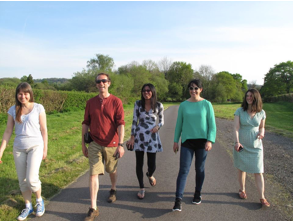 |
| Terri Trimble, Mike Pringle, Tania Tay (retreat organiser) Olivia Kiernan and Melissa Rogerson |
When I got home, I tried to work out how the retreat got me out of my editing spiral. Was it just the laughter, the craft advice, and the synchronicity? Maybe. Every writer I spoke to, newbie, or published author, generously shared their experience.
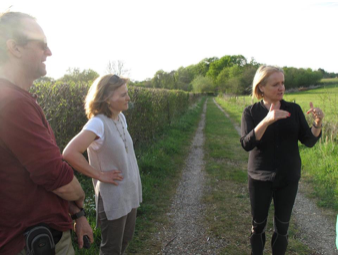 |
| Mike Pringle, Maria Farrer, Lucy van Smit |
Their advice was to call my agent and ask for clarification on the edits. Duh. I’d simply not asked enough questions, and my agent, the scarily talented Sallyanne Sweeney, assumed I knew why she liked my writing, as she was the competition judge, who had offered me representation. My fears were laid to rest, her edits were much closer to my original concept than I realised.
The publisher Rachel Mann told us this story of a writer who’d misunderstood her structural edits and rewritten her book, and lost what made it wonderful in the first place. Rachel said in the publishing world, editing doesn’t mean re-writing from scratch. How had I got it so wrong?
In business when you restructure a company, one approach is called Appreciative Enquiry, and the idea is to focus on what works well. The theory is if you improve the positive, say the 80% that is already successful, you will have a better return, than focusing on the negative 20%. And the technique they use is to ask questions, because the quality of the questions determines the culture. I suspect editing is the same, focus on what is working and improve that, otherwise the risk is we spend too much energy on what doesn’t work, and only marginally improve the book.
As writers we ask questions all the time, what does our main character want? What is her flaw? How will that prevent her getting her goal? And we break that story down scene-by-scene, asking better, and better questions, to get to the heart of the story.
In editing a TV documentary, a good rule is you only get to say one thing in a scene. One thing? It’s taken me decades to understand what that means. Think of you want to say, and then say it. Simply. Because, no matter how flashy the film looks, how much research you’d done, the question always asked is: what is the story?
My favourite observation on Masterchef is too many ideas confuse the dish. I knew this as a painter, I loved bold images, but I forgot to apply that to my editing.
How the retreat shifted my bunker mentality.
The business strategist, Tony Robbins, bangs on about States of Mind, and how we can’t find the best creative solution, when our emotions hijack us, and we are anxious, pissed off and exhausted. He has a simple four-step approach to get out of a funk, and it explains why the retreat works so well.
- Read. Robbins advises feeding your mind, read an hour a day, read something you love, something that inspires you. And that will help shift your emotional state. I realised in my panic, I’d told myself I had no time to read, until I’d finished the edits. Removing one of my greatest pleasures had exacerbated my stress at a critical time. On the retreat, writers read their work to us, and talked about their favourite books, so we buzzed with inspiration the whole weekend.
- Get active. Robbins says fear feels physical, and you have to do something physical to change that emotional state. He advocates ten minutes of intensive activity to get your blood pumping. Again time poor, I’d stopped going to yoga, and breathing deeply. On the retreat, exercise was a blissful walk through bluebell woods. But at home, I reckon a burst of nutter dancing to music, in front of your desk, would do the trick, and put you in the right frame of mind.
- Spend time with inspirational people. Hah. You know where I am going with this. On a SCBWI retreat, this is a given.
- Contribute. Robbins argues that giving back, volunteering, is key to changing a negative emotional state. We appreciate what we have, and realise how small our problems are.
 |
| SCBWI volunteers - Alex English, Kathryn Evans, Teri Terry |
On the retreat, the volunteers gave the most, but everyone helped someone. I walked around the gardens with Tania, spending an hour talking about her stories, it helped her to make a decision, and I felt glad I could return a favour.
Finally, the retreat gave me back my delight in putting words on a page, and learning my craft. So this is my go-to position: to remember I love writing, before I start work. And nurture myself with exercise, inspirational company, and lots of reading. Melvin Burgess’s advice made perfect sense, choose to be a good writer, before yearning to become an author.
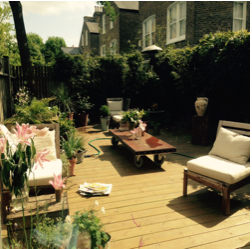 |
| Lucy van Smit’s back yard in South London |
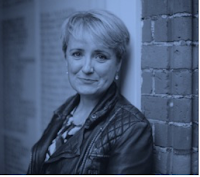 |
| @lucyvansmit |
LUCY VAN SMIT Lucy’s YA novel, Hurts So Good, won the 2015 Bath Children’s Novel Award, and was shortlisted for the Caledonian Novel Award. After Art School, Lucy produced TV documentaries on Martin Amis, Ian McEwen, and John Le Carré, before realizing that writers were her tribe, and did an MA in Writing at Bath Spa. Represented by Sallyanne Sweeney, Lucy lives in London with her husband and teenage son. Her middle grade thriller, Invisible by Day, won the first SCBWI Slushpile Challenge. Lucy loves watching Netflix, claiming she’s researching tips on writing
.https://www.writersandartists.co.uk/2016/04/on-the-road-by-lucy-van-smit http://bathnovelaward.co.uk/2016/01/13/interview-with-lucy-van-smit-bath-childrens-novel-award-2015-winner/


